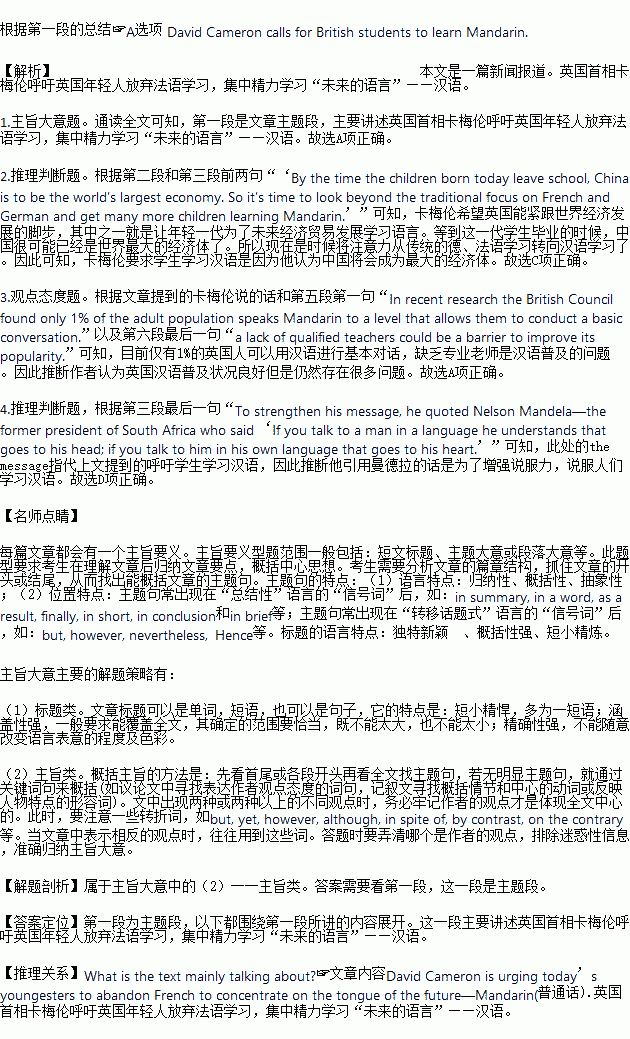题目内容
David Cameron is urging today’s youngesters to abandon French to concentrate on the tongue of the future—Mandarin(普通话)。
Cameron said: “I want Britain linked up to the world’s fast-growing economies. And that includes our young people learning the languages to seal tomorrow’s business deals.”
“By the time the children born today leave school, China is to be the world’s largest economy. So it’s time to look beyond the traditional focus on French and German and get many more children learning Mandarin.” To strengthen his message , he quoted Nelson Mandela—the former president of South Africa who said “If you talk to a man in a language he understands that goes to his head; if you talk to him in his own language that goes to his heart.”
Cameron said that a partnership between the British Council (英国文化协会) and Hanban will double the number of Chinese language assistants in the UK by 2016 and provide increased funding to schools of offering Mandarin as a language choice. In a development of the UK—China School Partnership programme, funding will also be provided for 60 headteachers to make study visits to China in 2014.
In recent research the British Council found only 1% of the adult population speaks Mandarin to a level that allows them to conduct a basic conversation. Just 3,000 pupils in England, Wales and Northern Ireland entered for Chinese languages GCSEs in 2013, putting it far behind the traditional choices of French with 177,000, Spanish with 91,000 and German with 62,000 entrants(加入者), as well as Urdu, Polish and Arabic.
Professor Dame Helen Wallace, the British Academy’s foreign secretary, said, “ a lack of qualified teachers could be a barrier to improve its popularity.”
Laura Chan, one of the co—founders of a bilingual Mandarin—English primary school, said the prime minister’s announcement was good news for the status of Mandarin. She said, “It’s a great help. It will increase people’s awareness of Mandarin as a language they can learn.”
1.What is the text mainly talking about?
A. David Cameron calls for British students to learn Mandarin.
B. David Cameron has visited China for three days.
C. Chinese language is very popular with British people.
D. The cooperation is important between the UK and China.
2.Why does David Cameron urge students to learn Chinese?
A. Because Chinese will be a widely—used language in the world.
B. Because there are many Chinese people living in Britain.
C. Because he thinks China will become the largest economy.
D. Because only a few of British people can communicate in Chinese.
3.What is the writer’s attitude to the popularity of Mandarin?
A. It’s wonderful but it also has some problems.
B. It can be a great waste of time and energy.
C. It’s only a design for the youngsters later.
D. It’s only a way to help students to travel abroad.
4.What is the purpose of David Cameron by quoting Mandela’s words in Paragraph3?
A. To compare different ideas.
B. To show his rich knowledge.
C. To share Mandela’s opinion.
D. To persuade people to learn Mandarin.
 阅读快车系列答案
阅读快车系列答案
